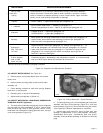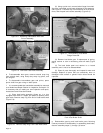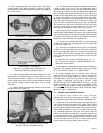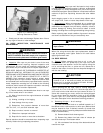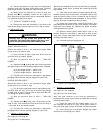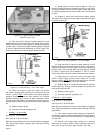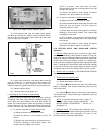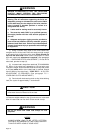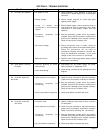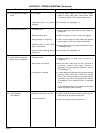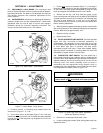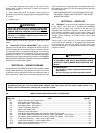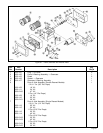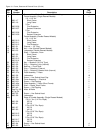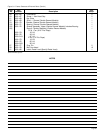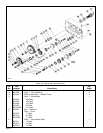
Page 19
SECTION Vl - TROUBLE SHOOTING
Trouble Probable Cause Remedy
a. Check switches, circuit breakers or fuses and
connections in power supply lines. Check power
collectors.
b. Check voltage required on motor data plate
against power supply.
c. Shut off power supply, remove electrical cover on
hoist and check wiring connections. Also check
connections in push button station and limit
switches.
d. See that necessary jumper wires are properly
installed. Verify that the contactor armatures are
free to move. If binding occurs, replace contactor.
Check for burned out contactor coils.
e. Check transformer fuse. If blown, check for
grounding and/or shorts in the push button station.
Check the transformer coil for signs of
overheating. Replace transformer if burned out.
Verify the transformer secondary is the same
voltage as the coils to which it is connected.
f. Replace motor. Check input power supply. Check
hoist motor connections.
a. Interchange any two power supply line leads.
Refer to Section II, paragraph 2-4 b.
b. Check wiring connections with appropriate wiring
diagram.
a. Check for loose connections. See that necessary
jumper wires are properly installed on contactor.
b. See that necessary jumper wires are properly
installed. Verify that the contactor armatures are
free to move. If binding occurs, replace contactor.
Check for burned out contactor coils.
c. Check push button contacts and wires.
a. Reduce loading to rated load of hoist, as shown
on nameplate.
b. Check for loose connections. See that necessary
jumper wires are properly installed on contactor.
Check limit switch mounting and connections.
c. See that necessary jumper wires are properly
installed. Verify that the contactor armatures are
free to move. If binding occurs, replace contactor.
Check for burned out contactor coils.
d. Check push button contacts and wires.
6-1. Hoist Will Not Operate.
6-2. Hook Moves in Wrong
Direction.
6-3. Hook Will Raise But
Not Lower.
6-4. Hook Will Lower But
Not Raise.
a. No power to hoist.
b. Wrong voltage.
c. Loose or broken wire
connections in hoist electrical
system.
d. Contactor assembly not
functioning.
e. No control voltage.
f. Motor burned out.
a. Reverse phasing on three-
phase hoists.
b. Hoist wired wrong.
a. Lower electrical circuit open.
b. Contactor assembly not
functioning.
c. Down, push button inoperative.
a. Excessive load.
b. Hoist electrical circuit open.
c. Contactor assembly not
functioning.
d. Up, push button inoperative.



